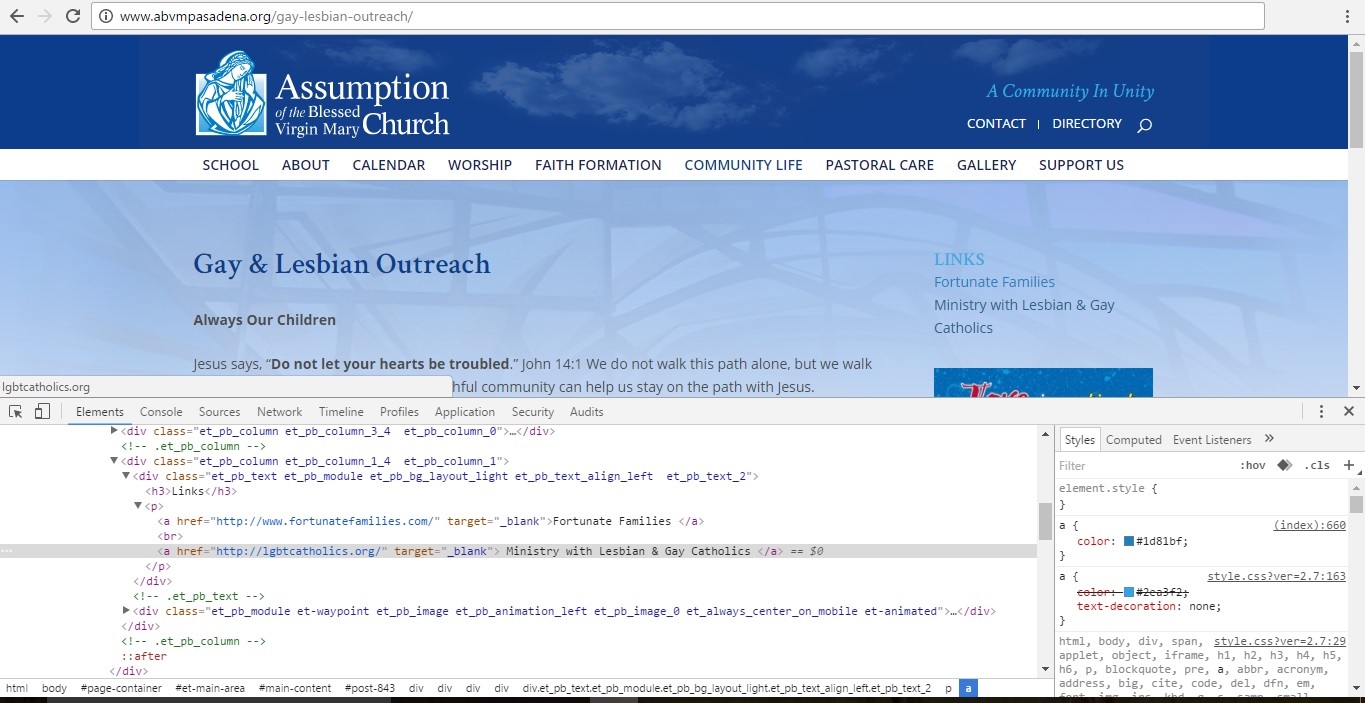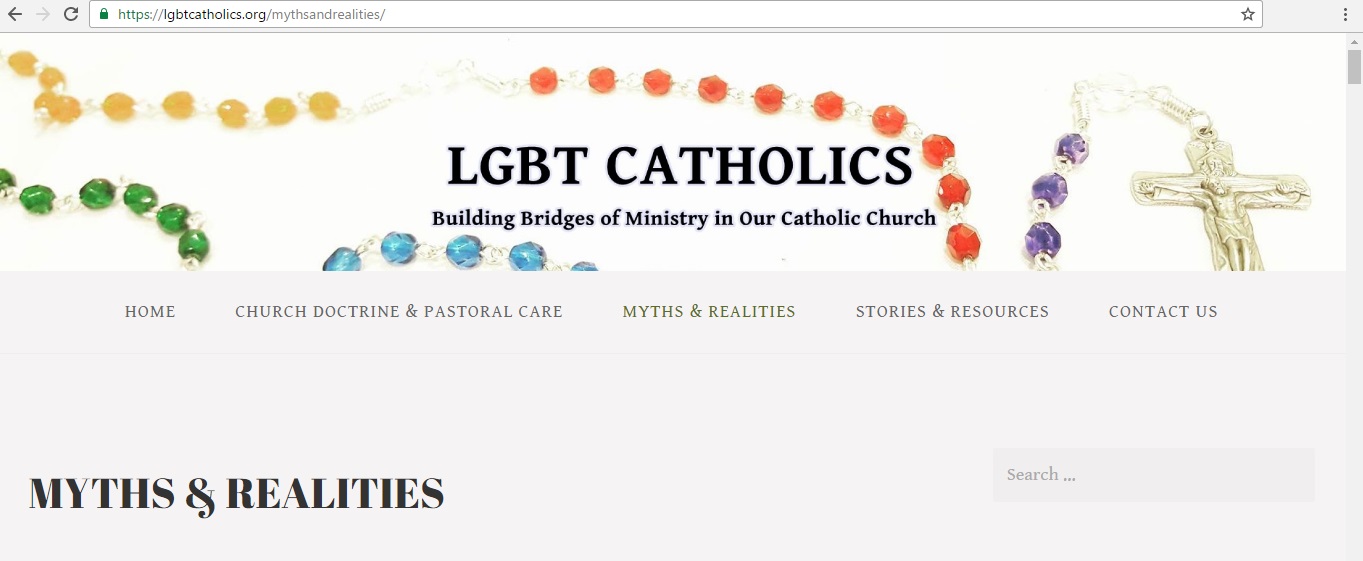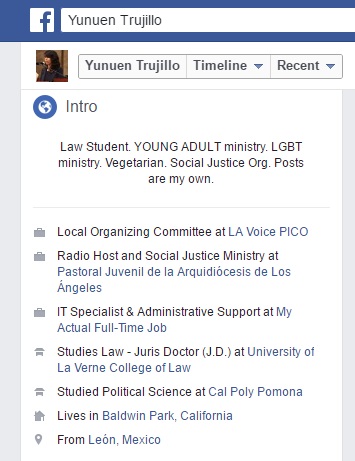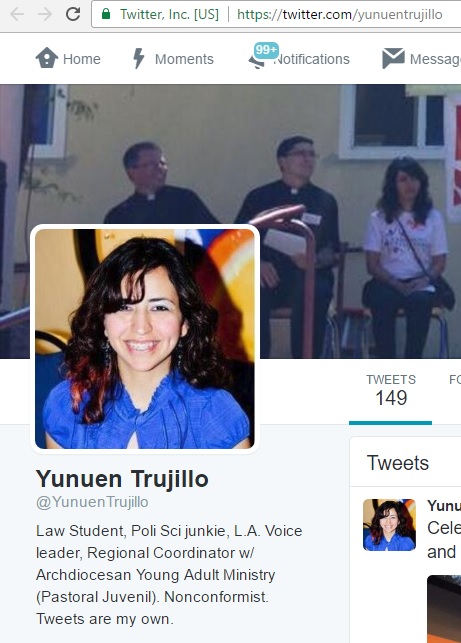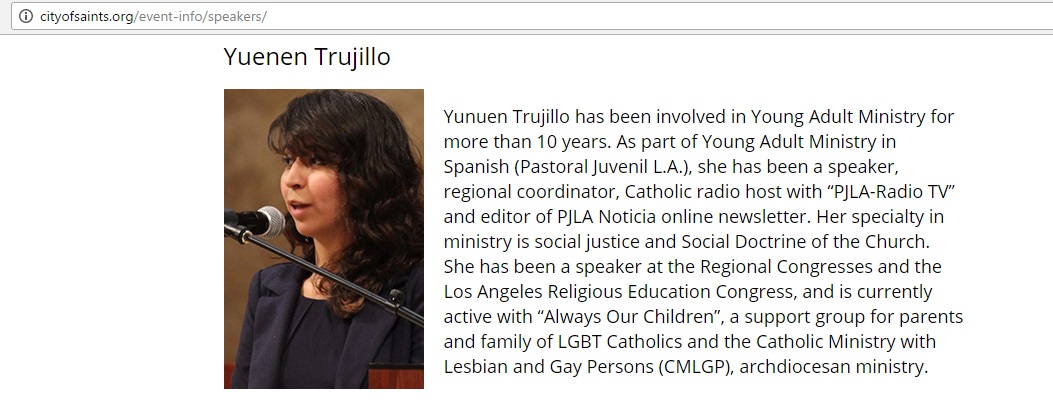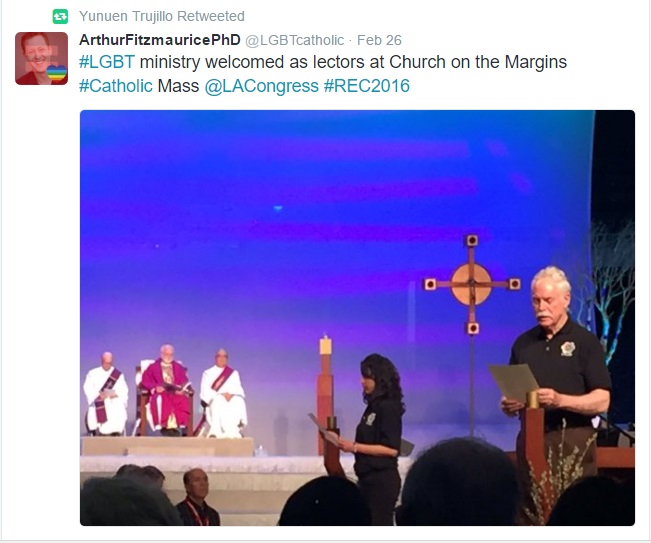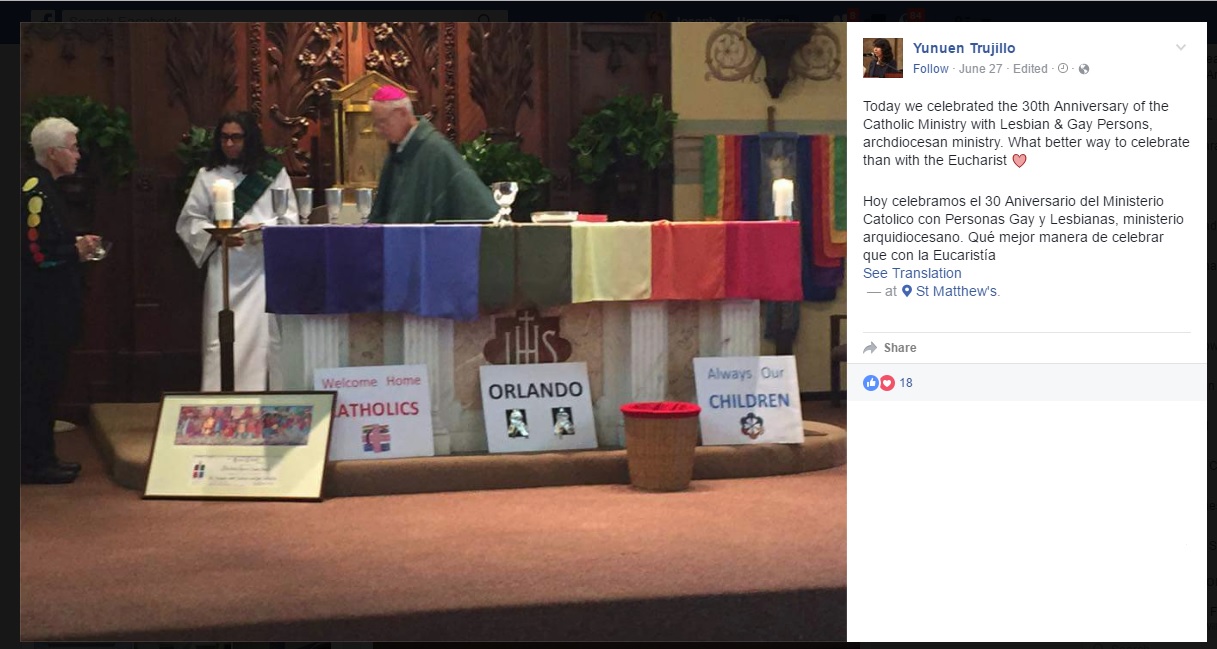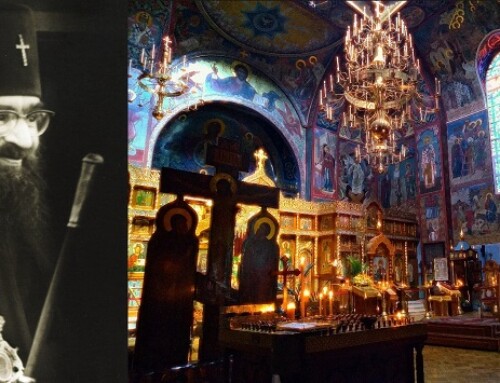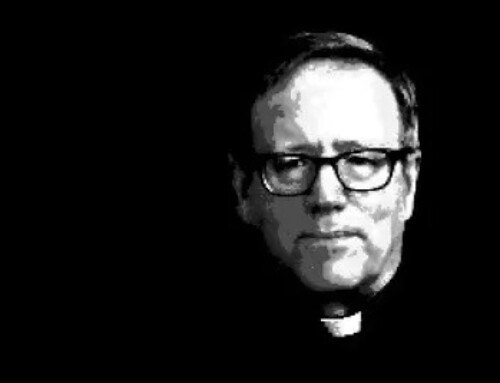At the homepage for the “Gay & Lesbian Outreach” (Always Our Children) located at Assumption of the Blessed Virgin Mary Catholic Parish in Pasadena (in the Archdiocese of Los Angeles) there are two links: one to the dissident group Fortunate Families and the other to something labeled as “Ministry with Lesbian & Gay Catholics.”
First of all, Fortunate Families is a pro-gay “Catholic” apostolate designed primarily for the parents of homosexual children; they have been a strong advocate for the legalization of same-sex marriage. After the Obergefell v. Hodges decision, Deb Word, President of Fortunate Families, released the following statement:
“Fortunate Families celebrates with our LGBT children the opportunity to share in the same rights as their straight siblings. The Supreme Court decision brings legal stability to our children’s lives and security to our grandchildren. We applaud this decision and continue our work in the Catholic tradition seeking social justice for all our children…”
As for the link to The Ministry with Lesbian & Gay Catholics, it actually connects to a site titled: “LGBT Catholics: Building Bridges of Ministry in Our Catholic Church” (www.lgbtcatholics.org). On their homepage, under the tab “Church Doctrine & Pastoral Care,” is a video featuring a speaker named Yunuen Trujillo. According to her Twitter and Facebook accounts, Trujillo is a “Regional Coordinator with the Archdiocesan Young Adult Ministry.” She has also been a speaker at the LA Religious Education Congress (2016), is a “Catholic” radio host with PJLA-Radio TV, and is active with Always our Children: “a support group for parents and family of LGBT Catholics and the Catholic Ministry with Lesbian and Gay Persons (CMLGP), archdiocesan ministry.”
In the approximately 45 minute long video, Trujillo focuses her talk on three aspects of the Church’s doctrine with regards to homosexuality: 1.) Dignity of the Human Person; 2.) Harassment, discrimination, hatred, and violence against homosexual persons…; 3.) All are called to chastity.
The most troublesome and puzzling section of the talk is the following description of her theory on homosexuality and chastity where she gives a none-too-subtle endorsement of the “born gay” argument:
The Catechism defines chastity as “the INTEGRATION of sexuality within the person”. Chastity is “the INTEGRATION of sexuality within the person”. Chastity is not about “not having sex”, chastity basically is about making sure that any sexual act that happens in our lives is with our whole being: our emotions, our thoughts, our plans for the future…
I just want to say a couple of things about chastity and same sex couples. We know that Church Doctrine is “sacramental marriage is between a man and a woman”, and that is settled doctrine as of this moment that I’m writing to you. This doctrine is based on the belief that people who are in a same sex relationship are going against how they were created by God. Basically, the belief is: “they’re doing this because of other reasons, but they’re choosing to be with someone whom they are not naturally inclined to have this emotional, mental, spiritual, romantic connection with”. So, what’s at the center of this discussion is whether you choose to be LGB or whether you are born that way.
Church, the same as government… they are institutions that exist to preserve the stability of society, that’s one of the main roles of these two institutions. It is for that reason that, both church and government don’t change overnight, and if they do change, it is because there is a more substantive reason than mere demand for change.
For instance, at some point in history, church teaching was that the earth was flat and the sun revolved around the earth, and then Galileo came and said “you know what, the earth actually revolves around the sun and you just have to observe the stars and see this, and the earth actually moves, and the earth is not flat”. At this point, the Church wasn’t willing to say “this is true”, until more substantive scientific research came about and that’s when this doctrine changed.
Am I saying doctrine is going to change? I’m not saying that, but what I AM SAYING is that… when you talk to LGBT people and when you listen to their stories, they can tell you “you know, this is how I was born, this is how I was made”. You may not agree with it, but THE POINT IS this: to people who are in a same sex relationship… they are not going against God, they are not “sinning”, IN FACT they are doing the opposite, they are HONORING THAT CHASTITY, they are HONORING THAT INTEGRATION of their sexuality with every other aspect of themselves (their emotions, their plans for the future) when they are with a person of the same sex, simply because they are wired to have this romantic connection with people of the same sex.
They may not know why they are wired that way, or what’s God’s purpose for this, but they do not choose to go against Church Doctrine, to them this is not a choice…
…Not all stories are the same. You are going to hear stories about people who have chosen to remain chaste, you will find stories of people who have partners, and you WILL find that they can be equally holy and it is going to be absolutely mind-blowing, and you’re not going to understand why at the beginning. But you are going to be able to see stuff that you may not be able to see right now, when you get to actually listen to stories.
Overall, Trujillo mixes what seems to be an imaginative reading of the Catechism with bad theology from gay-affirmative ministries. At times, she reiterates the teachings of the Church, for instance, she says:
The Catechism defines chastity as “the INTEGRATION of sexuality within the person”. Chastity is “the INTEGRATION of sexuality within the person”. Chastity is not about “not having sex”, chastity basically is about making sure that any sexual act that happens in our lives is with our whole being: our emotions, our thoughts, our plans for the future.
Later, she adds this subtle nuance, which, at best, is incredibly ambiguous – especially for the conflicted and the confused:
…what I AM SAYING is that… when you talk to LGBT people and when you listen to their stories, they can tell you “you know, this is how I was born, this is how I was made”. You may not agree with it, but THE POINT IS this: to people who are in a same sex relationship… they are not going against God, they are not “sinning”, IN FACT they are doing the opposite, they are HONORING THAT CHASTITY, they are HONORING THAT INTEGRATION of their sexuality with every other aspect of themselves (their emotions, their plans for the future) when they are with a person of the same sex…
It’s also extremely unhelpful that she emphasizes [in her own ALL CAPS print] the same language in both examples. For the “integration” of sexuality in the heterosexual is not the same as the integration of homosexuality in a same-sex relationship. In the “Letter to the Bishops of the Catholic Church on the Pastoral Care of Homosexual Persons,” the Holy See warned about a certain “studied ambiguity” with regards to the statements made by some “gay” and LGBT ministries working within the Church; I think this is a clear example of that.
Another instance is when Trujillo compares Church doctrine with the “experience,” or “stories” as she calls them, of “gay” men and women; she states that Catholic prohibitions against same-sex relations are:
“…based on the belief that people who are in a same sex relationship are going against how they were created by God.”
In other words, because gay men and women are “wired” (born) a certain way, they are not fully complicit for their actions; more so, because these predilections are inherent within their being, they are in fact good. Professor Vincent Pizzuto Associate Professor of The New Testament in the Department of Theology and Religious Studies at the University of San Francisco, wrote “that homosexuals are ethically bound not to act contrary to their nature as homosexuals. Or, to state this more positively, the ethics of homosexuality begins with an honest recognition, admission and integration of one’s God-given homosexual orientation, and results in a life lived in gratitude for, and loving expression of one’s sexuality.”
This notion of lived experience or “stories” as an arbiter of change within the Church is a mainstay in a majority of “gay” affirmative ministries; as with most of these toxic theories in such “gay” Catholic circles, they have their genesis with dissident “gay” priest John J. McNeill who once wrote: “In light of gay Christian experience, two fundamental issues of sexual morality must be re-examined. The first issue is what makes a sexual act fully human; the second is the biblical understanding of homosexual acts.” (Later, Trujillo will tackle the story of Sodom and Gomorrah.) The centrality of the gay Christian experience or the “lived experience” of homosexuals is essential to the argument for changes, or at least modifications, in Church doctrine from such groups as Dignity and New Ways Ministry; from DignityUSA: “…the Church must be instructed by the lived experience of its people…Invoking God’s name, Church officials have forbidden us to live as God made us. They have told us to feel shame and guilt for who we are and what we do as sexual beings. They have commanded us not to speak of the truth that we know. The validity of our experience is denied — the most subtle and damaging form of oppression.”
This sort of benevolent, even beneficial view of the homosexual orientation is expressed in this statement from the dissident group The Catholic Association for Lesbian and Gay Ministry (CALGM), as members:
“…seek to apply Church teachings regarding the successful integration of sexuality and spirituality and the recognition of the dignity, respect and inclusion of gay and lesbian persons in the life and mission of the Church.”
CALGM continues to have strong ties with the Los Angeles Archdiocesan Catholic Ministry with Lesbian & Gay Persons (CMLGP) as witnessed in the not insignificant influence of Arthur Fitzmaurice, the Resource Director of CALGM who also formerly served as Chair for the Los Angeles CMLGP. Fitzmaurice and Trujillo were both speakers at the 2016 LA Religious Education Congress; both will speak at the 2017 Congress.
In a 2013 video interview for The IN [Ignatian News] Network, made in cooperation with St. Monica’s Catholic Gay and Lesbian Outreach in Santa Monica, Arthur Fitzmaurice said: “I tried to be directed towards God…How do I be the person that God made me to be; and then it gets converted into a realization that God made me to be this gay person.” In her video, Trujillo voiced similar sentiments by stating: “For me being LGBT has been a gift, it has been a blessing.” Dissident Jesuit theologian James L’Empereur, in his influential book “Spiritual Direction and the Gay Person,” wrote: “Homosexuality is on of God’s most significant gifts to humanity. To be gay or lesbian is to have received a special blessing from God.”
Trujillo also sows confusion in her discussion about “changes” in Church doctrine; first she states: “We know that Church Doctrine is ‘sacramental marriage is between a man and a woman’, and that is settled doctrine as of this moment that I’m writing to you.” Her use of the qualifier “as of this moment” clearly implies that perhaps this will change; especially after she gives a rather belabored explanation of how and why the Church altered its position on other matters; she added: the Church “don’t change overnight.” This sentiment is in agreement to those expressed by gay-affirmative ministries: during an interview from 2015, Fr. Donal Godfrey, S.J., the former director of campus ministry at the Jesuit-run University of San Francisco and frequent speaker at Most Holy Redeemer (MHR) and various other gay-affirming parishes in San Francisco, said: “I don’t expect the teachings to jump to acceptance in one day, it will take decades. In the meantime we need to accept people pastorally as they are and where they are. For now, this would be sufficient. Later the teachings will catch up and evolve.”
In his book about MHR, “Gays and Grays,” Godfrey encapsulates much of the rhetoric which I think is behind Trujillo’s often tortured reasoning:
“One listens to the official Church teaching and takes it seriously, and then one asks what does my life experience say to this teaching. One also brings the secular human sciences to bear on the topic, the scriptures, and the experience of the contemporary community…Whenever our conscience goes against the teachings of the church there is tension, but it is a healthy tension. We know that the development of doctrine does take place over time…Once we believed that the earth was the center of the universe. It took our church a long time to recognize that truth…for many at MHR remain good Catholics and at the same time dissent in conscience from church teaching on certain issues, including homosexuality. That there are loyal Catholics who dissent in conscience, as at MHR, is what allows theology to grow.”
Most troubling is when Trujillo compares those homosexuals “who have chosen to remain chaste” with those “who have partners,” she says they are “equally holy.” According to the Catechism, those with the homosexual inclination are “called to chastity.” There are no exceptions given. In the example given by Trujillo, it is logical to assume that those she mentions who are with partners are not chaste become she compares them with those who “remain chaste.” According to a document from the Congregation of the Doctrine of the Faith on “Considerations Regarding Proposals to Give Legal Recognition to Unions Between Homosexual Persons,” those with same-sex attraction:
…are called, like other Christians, to live the virtue of chastity. The homosexual inclination is however “objectively disordered” and homosexual practices are “sins gravely contrary to chastity”
The false equivalency expressed by Trujillo is shared by the founders of Fortunate Families; in 2015 the co-founders of Fortunate Families, Casey and Mary Ellen Lopata, published a “Letter” they wrote to Pope Francis, in which they detail their support for same-sex marriage and their experiences related to an ongoing 20 year friendship with a “married” “gay” male couple; the Lopatas are the godparents for the couple’s two adopted children. They describe the two men and their children as “a model Catholic family.” According to the “Letter:”
“These two gay men have accepted their God-given sexual orientations and are striving to follow God’s will in their lives. Though our two godchildren are not being raised by their biological parents, their gay parents through their complementary (though not in the reproductive sense) and loving relationship have created a family every bit as authentic and holy—and life-giving—as that of any heterosexual relationship we know of including our own.”
Farther along in the talk, Trujillo discusses the story of Sodom and Gomorrah; she states that the “sin” of Sodom had nothing to do with homosexuality:
“…it is about LACK OF HOSPITALITY to the foreigner, the wickedness in these people’s hearts.”
This erroneous theory is often repeated in gay-affirmative Catholic ministries; with its most famous proponent being John J. McNeill who wrote:
“It would seem fairly certain…that the Sin of Sodom was understood in biblical times as one of inhospitality.”
Later in life, McNeill left the priesthood to “marry’ his longtime homosexual lover.
Lastly, Trujillo makes a false analogy between masturbation as “disordered” in the Catechism with the same term being used with regards to homosexuality; she says: “I think that most people reading this would fall into that category of ‘intrinsically disordered.’” Yet, she disregards the fact that the Catechism refers to both homosexual activity as well as the homosexual orientation as a “disorder.” This is significant because, masturbation is solely an activity it is not an orientation and it is surely not an identity. Whereas a heterosexual “disorder” is ultimately redeemable within the Sacrament of Marriage, the homosexual “disorder,” or same-sex genital activity, no matter the context – is not.
Another tab on the website is labeled “Myths & Realties;” here, Trujillo methodically tries to disprove certain so-called “myths” about homosexuality and the “gay” lifestyle. I will refute each one.
“Whenever speaking about this topic, we must consider the findings of the biological sciences and we must remember that, a sexual orientation, whether gay or straight, is a normal variation in the spectrum of human sexuality.”
This is a wholly secular view which is contrary to what was stated in the 1986 “Letter to the Catholic Bishops of the Catholic Church on the Pastoral Care of Homosexual Person:”
“Although the particular inclination of the homosexual person is not a sin, it is a more or less strong tendency ordered toward an intrinsic moral evil; and thus the inclination itself must be seen as an objective disorder.”
“No, HIV/AIDS is not exclusively an LGBTQ disease.”
True, but this neglects the fact that the vast majority of HIV infections in the US occur in “gay” men: according to the CDC:
In 2014 –
Gay and bisexual men accounted for 83% (29,418) of the estimated new HIV diagnoses among all males aged 13 and older and 67% of the total estimated new diagnoses in the United States.
Gay and bisexual men aged 13 to 24 accounted for an estimated 92% of new HIV diagnoses among all men in their age group and 27% of new diagnoses among all gay and bisexual men.
Gay and bisexual men accounted for an estimated 54% (11,277) of people diagnosed with AIDS. Of those men, 39% were African American, 32% were white, and 24% were Hispanic/Latino.
“…your heterosexuality, just like a gay person’s homosexuality, has relative stability. This means that if you are heterosexual person, you will be heterosexual your whole life. You will not wake up tomorrow being homosexual, just like a homosexual person will not wake up tomorrow being heterosexual. Sexual orientation is relatively stable.”
Not true. Dr. Simon LeVay, a neurobiologist at both Harvard Medical School and the Salk Institute who worked to find the so-called missing “gay gene,” who is also an openly gay man, said that: “A person’s sexual orientation is not necessarily a fixed, life-long attribute. Sexual orientation can change…”
“Whether someone is an unhealthy/unfit parent depends on many other aspects of life and values. There are unhealthy/ unfit parents in both the heterosexual and homosexual communities, just like there are healthy/fit parents in both communities as well.”
This is a false analogy. According to the document “Considerations Regarding Proposals to Give Legal Recognition to Unions Between Homosexual Persons:”
“As experience has shown, the absence of sexual complementarity in these unions creates obstacles in the normal development of children who would be placed in the care of such persons. They would be deprived of the experience of either fatherhood or motherhood. Allowing children to be adopted by persons living in such unions would actually mean doing violence to these children, in the sense that their condition of dependency would be used to place them in an environment that is not conducive to their full human development.”
“…we need to acknowledge our own sins. People with crazy, promiscuous lifestyles come in all colors and sexual orientations: gay, straight, etc…This lifestyle exists in both the gay and the straight world and we need to acknowledge our own community’s sins.”
Partially true, but deceptive. The presence of extreme promiscuity is more pervasive in the “gay” male community than any other population group. According to a study of “gay” men in New York City, “MSM [men who have sex with me] reported more sex partners in the past year than MSW [men who have sex with women]; 29.1% of MSM and 8.7% of MSW reported 4 or more partners.” As a result: “MSM were at least 140 times as likely to be diagnosed with either HIV or P&S syphilis.”
“LGBT people can be profoundly affected by family and societal rejection that causes high level of suicide attempts and other difficulties.”
Partially true, but deceptive. According to a study in Sweden: “The risk of suicide was higher among same-sex married individuals as compared to different-sex married individuals…Among same-sex married men the suicide risk was nearly three-fold greater as compared to different-sex married. This holds true also after adjustment for HIV status. Even in a country with a comparatively tolerant climate regarding homosexuality such as Sweden, same-sex married individuals evidence a higher risk for suicide than other married individuals.”
“…there is no statistically significant correlation between abuse and sexual orientation, we cannot claim one thing causes the other.”
Not true. There have been numerous studies which confirm that homosexual men and women experienced a greater degree of both physical and emotional abuse as children:
“Gay” men are more likely than heterosexual men to have experienced childhood physical and sexual abuse, and to have come from a “dysfunctional” home.
“The prevalence rates of child physical abuse significantly differed across sexual orientations for men. Specifically, heterosexual men reported fewer cases of physical abuse than gay men. The prevalence rates of child sexual abuse also significantly differed across sexual orientations…Rates of neglect also differed across sexual orientation among men. Heterosexual men reported fewer instances of neglect than gay men and bisexual men. Rates of household dysfunction also differed across sexual orientation among men. Specifically, heterosexual men reported fewer household dysfunction events than bisexual men and gay men.”
“Comparing the Rates of Early Childhood Victimization across Sexual Orientations: Heterosexual, Lesbian, Gay, Bisexual, and Mostly Heterosexual”
Christopher Zou and Judith P. Andersen
PLoS One. 2015; 10(10): e0139198.
“Rates of childhood sexual abuse (CSA) among MSM have been estimated as high as 46 %.”
“Complexity of Childhood Sexual Abuse: Predictors of Current Post-Traumatic Stress Disorder, Mood Disorders, Substance Use, and Sexual Risk Behavior Among Adult Men Who Have Sex with Men.”
Boroughs MS, et al.
Arch Sex Behav. 2015 Oct;44(7):1891-902.
“Compared with heterosexual respondents, gay/lesbian and bisexual individuals experienced increased odds of six of eight and seven of eight adverse childhood experiences, respectively [e.g., physical, sexual and emotional abuse, neglect, exposure to domestic violence, parental discord, familial mental illness, incarceration and substance abuse]. Sexual minority persons had higher rates of adverse childhood experiences compared to their heterosexual peers.”
“Disparities in Adverse Childhood Experiences among Sexual Minority and Heterosexual Adults: Results from a Multi-State Probability-Based Sample”
Judith P Andersen, and John Blosnich
PLoS One. 2013;8(1):e54691. doi: 10.1371/journal.pone.0054691. Epub 2013 Jan 23.
“Men Who Have Sex With Men Have a 140-Fold Higher Risk for Newly Diagnosed HIV and Syphilis Compared With Heterosexual Men in New York City”
Preeti Pathela, DrPH, MPH, et al.
J Acquir Immune Defic Syndr Volume 58, Number 4, December 1, 2011
“Suicide in married couples in Sweden: Is the risk greater in same-sex couples?”
Björkenstam C, et al.
Eur J Epidemiol. 2016 May 11.

